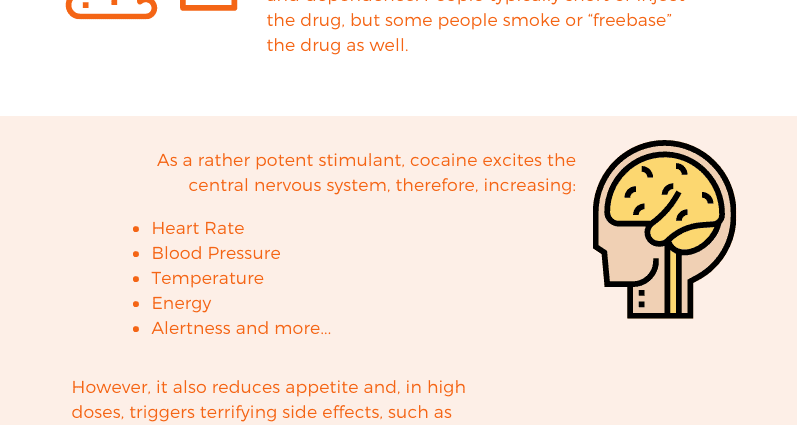Symptoms of cocaine addiction
The physiological and psychological signs associated with cocaine use are attributable to its powerful stimulating effects on the nervous, cardiovascular, gastrointestinal and respiratory systems of the body.
- Special signs associated with the use of cocaine:
— a feeling of euphoria;
– a state of contemplation;
– a surge of energy;
– speech acceleration;
– reduction of the need to sleep and eat;
– sometimes an ease in performing intellectual and physical tasks, but with a loss of judgment;
– increased heart rate;
– increase in blood pressure;
– faster breathing;
– dry mouth.
The effects of cocaine increase with the dose. The feeling of euphoria can intensify and create a strong restlessness, anxiety and, in some cases, paranoia. Large doses can cause serious damage and be life threatening. |
Health risks of long term use
- Risks for the consumer:
– certain allergic reactions;
– loss of appetite and weight;
— hallucinations;
– insomnia;
– damage to liver and lung cells;
– respiratory tract problems (chronic nasal congestion, permanent damage to the cartilage of the nasal septum, loss of sense of smell, difficulty swallowing);
– cardiovascular problems (increased blood pressure, irregular heartbeat, ventricular fibrillation, convulsions, coma, cardiac arrest with sudden death, with as little as a single 20 mg dose);
– lung problems (chest pain, respiratory arrest);
– neurological problems (headache, excitability, deep depression, suicidal thoughts);
– gastrointestinal problems (abdominal pain, nausea);
– hepatitis C from exchanging needles;
– HIV infection (cocaine users are more likely to engage in risky behaviors, such as sharing needles and having unprotected sex).
Cocaine can also cause complications related to certain health problems if the person already suffers from them (in particular: liver disease, Tourette syndrome, hyperthyroidism).
We should also mention that the combination cocaine-alcohol is the most common cause of drug-related mortality.
- Risks to the fetus:
– death (spontaneous abortion);
– premature birth;
– physiological abnormalities;
– weight and height below normal;
– long term: sleep and behavior disorders.
- Risks to the breastfed baby (cocaine passes into breast milk):
— convulsions;
– increased blood pressure;
– increased heart rate;
– respiratory problems;
– unusual irritability.
- Side effects of withdrawal:
– depression, excessive drowsiness, exhaustion, headache, hunger, irritability and difficulty concentrating;
– in some cases, suicide attempts, paranoia and loss of contact with reality (psychotic delirium).










